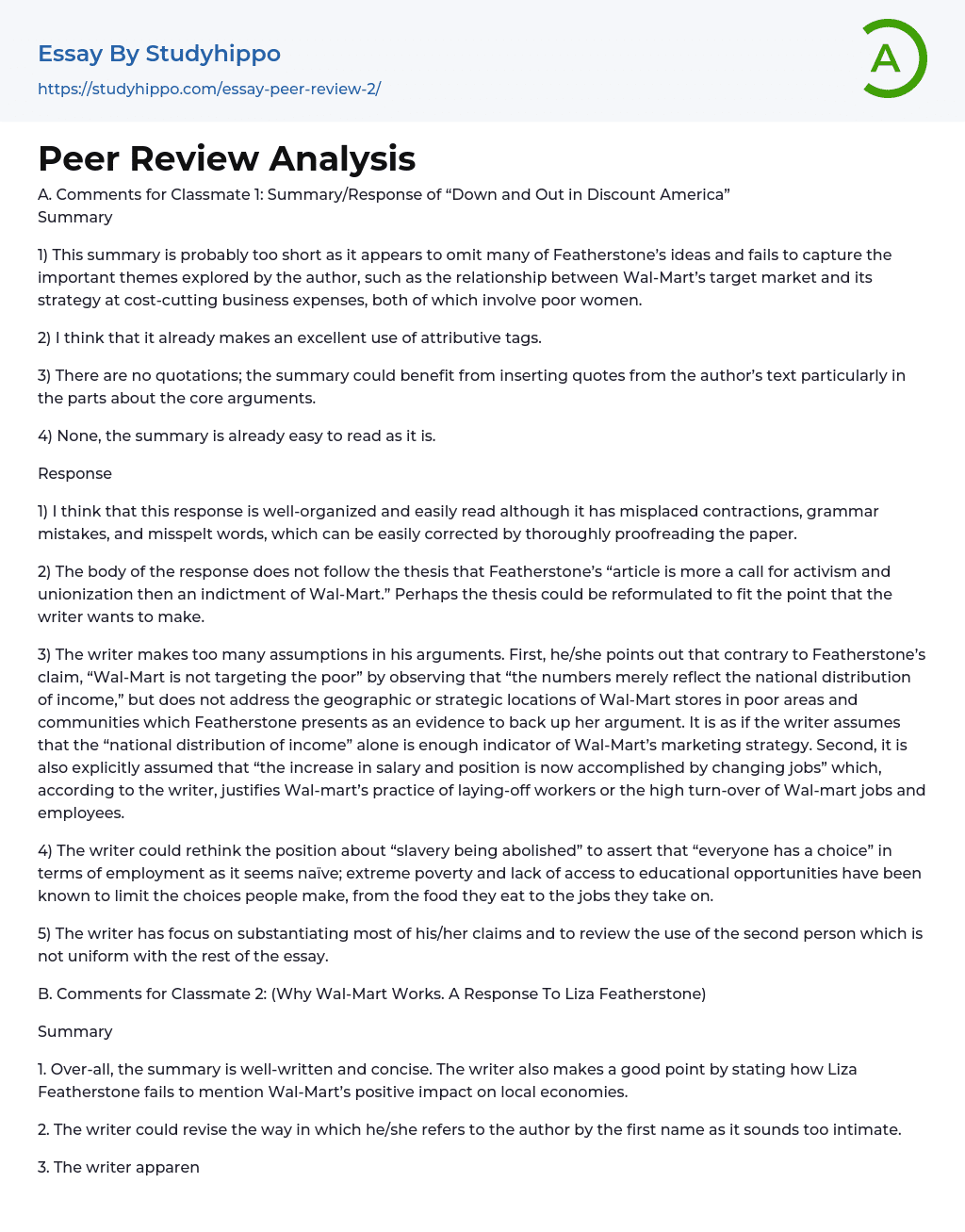Comments for Classmate 1: Summary/Response of "Down and Out in Discount America"
This summary may be inadequate as it leaves out several ideas by Featherstone and does not address the crucial themes explored by the author. These themes include the connection between Wal-Mart's target market and their cost-cutting strategy, both of which involve impoverished women.
I believe that the text already utilizes attributive tags exceptionally well.
3) The summary would be improved by including quotes from the author's text, especially when discussing the main arguments.
Option 4: No changes needed, as the summary is already in a clear and readable format.
The response is written within a paragraph tag with a style attribute that aligns the text to justify.
1) Although the response is well-organized and easily readable, it
...contains misplaced contractions, grammar errors, and misspelled words. However, these problems can be easily fixed by thoroughly proofreading the paper.
2) It can be suggested that the body of the response does not support the thesis that Featherstone’s article primarily urges for activism and unionization rather than condemning Wal-Mart. It is possible to restate the thesis to better align with the writer's intended argument.
3) The writer's arguments are based on several assumptions. First, the writer acknowledges that Featherstone's claim that "Wal-Mart is not targeting the poor" is contradicted by the fact that "the numbers merely reflect the national distribution of income." However, the writer does not address Featherstone's evidence regarding Wal-Mart stores being located in poor areas and communities. It appears that the writer assumes that the "national distribution of income" determines Wal-Mart's marketing strategy. Second, the
writer assumes explicitly that a salary and position increase can only be achieved through changing jobs. This assumption justifies Wal-Mart laying off workers and having high employee turnover.
The author proposes reconsidering the notion of "abolishing slavery" and proposing that individuals have a choice in their employment. However, this perspective may oversimplify the matter since extreme poverty and limited education can severely restrict options for individuals, affecting not only their job but also their dietary preferences.
The writer's main focus is to substantiate their claims and review the use of the second person, which is not consistent throughout the essay.
B. Comments for Classmate 2: (Why Wal-Mart Works. A Response To Liza Featherstone)
Summary
The summary is well-written and concise overall, pointing out the writer's opinion that Liza Featherstone fails to acknowledge the positive impact of Wal-Mart on local economies.
2. The writer may want to reconsider their use of the author's first name, as it comes across as overly familiar.
3. The writer misinterprets Featherstone's stance on boycotts, suggesting that the author advocates boycotting Wal-Mart. However, Featherstone clearly stated that boycotting is ineffective against Wal-Mart because impoverished individuals heavily rely on the store for their limited resources.
There are no further comments apart from the previously mentioned ones.
The given text, enclosed in , states the following:
The response is aligned to justify the text.
The thesis can offer the audience a mental outline of the weak points in Featherstone's argument that the writer addresses, in addition to discussing Wal-mart's overall economic benefits.
2. In order to improve the effectiveness of introducing a theme or argument, the
writer should enhance the main topics. Additionally, it is crucial for supporting arguments to stay focused on the main idea of each paragraph.
3. In my opinion, the problematic aspect of the response section lies in the argumentation and logical fallacies used. This is evident when the writer attempts to undermine Liza Featherstone's claims by pointing out that her article appears in a left-leaning publication. The insinuation being made is that Featherstone would have presented different arguments if she had written for a right-wing publication.
The assumption that unionization negatively impacts Wal-Mart's performance seems premature. To support this claim, the writer should provide evidence showcasing the substantial influence of unionization on Wal-Mart's losses in Germany. Moreover, hastily generalizing again, the writer suggests that unionization would lead to higher management expenses and ultimately increased prices for consumers.
While the article fails to highlight the beneficial influence of Wal-Mart operations in impoverished communities, it raises a crucial query regarding how smaller businesses that cannot match its vast resources are affected by Wal-Mart's monopoly over the lower-class market. However, there is a need for more clarification on the writer's argument about the positive impact of Wal-Mart on local economies.
- Mean essays
- Business Law essays
- Contract essays
- Consumer Protection essays
- Property essays
- Ownership essays
- Agreement essays
- Common Law essays
- Contract Law essays
- Justice essays
- Security essays
- Tort Law essays
- United States Constitution essays
- Crime essays
- Lawsuit essays
- Treaty essays
- Family Law essays
- Marijuana Legalization essays
- Constitution essays
- War on Drugs essays
- Court essays
- Jury essays
- Police essays
- Protection essays
- Community Policing essays
- Criminal Law essays
- Judge essays
- Lawyer essays
- Employment Law essays
- Copyright Infringement essays
- Injustice essays
- Intellectual Property essays
- Breach Of Contract essays
- Jurisprudence essays
- Social Injustice essays
- Juvenile Justice essays
- Internet Privacy essays
- Cyber Security essays
- Bill Of Rights essays
- Civil Liberties essays
- First Amendment To The United States Constitution essays
- Fourth Amendment To The United States Constitution essays
- Second amendment essays
- Animal Cruelty essays
- Law Enforcement essays
- Juvenile Justice System essays
- Surveillance essays
- Forensic Science essays
- Crime Prevention essays
- Criminal Justice essays




